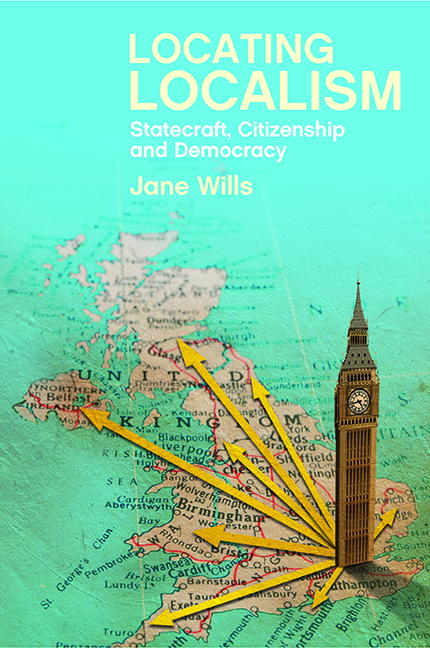Book contents
- Frontmatter
- Dedication
- Contents
- List of figures and tables
- Acknowledgements
- Introduction: the argument being made in this book
- one Making sense of localism
- two The geo-constitution and the long history of localism
- three The place of the people
- four Localist local government
- five Institution building for localist futures
- six Community organising: past, present and future
- seven A localist future?
- Appendix: Research design and methods
- References
- Index
six - Community organising: past, present and future
Published online by Cambridge University Press: 05 April 2022
- Frontmatter
- Dedication
- Contents
- List of figures and tables
- Acknowledgements
- Introduction: the argument being made in this book
- one Making sense of localism
- two The geo-constitution and the long history of localism
- three The place of the people
- four Localist local government
- five Institution building for localist futures
- six Community organising: past, present and future
- seven A localist future?
- Appendix: Research design and methods
- References
- Index
Summary
Thus far, this book has explored new forms of neighbourhood-level civic organisation that have emerged – directly or permissively – through the actions of government. As outlined in the previous chapters, national legislation has opened up the space for people to organise around planning, and local authorities and other state-funded bodies have also developed new ways to engage with community partners at the neighbourhood scale. This chapter now looks in more detail at the issue of community organisation and capacity. People have always built and supported organisations around their own particular interests such as religion, politics and sport, as well as their need for self-help. As already outlined in Chapter Three, people are differentially engaged in such organisations and there is an uneven distribution of organisations between different locations. In this regard, there have long been efforts to foster more community development in the poorest parts of the country (Twelvetrees, 2008; and for the example of the Community Development Project established in the 1970s, see Chapter Three). Such community development is variously envisaged as a way to strengthen social relationships, to provide better services and to foster local capacity (Wyler, 2009). Once it is established, there is further scope for local organisations to work with each other to strengthen the collective voice, representation and capacity of the local community (Saegert, 2006).
These efforts have been captured in concepts such as ‘community capacity’ (Chaskin, 2001), ‘local effectivity’ (Cooke, 1989), ‘localities as agents’ (Cox and Mair, 1991) and ‘collective efficacy’ (Sampson, 2012). Such concepts reflect the way that the geography of social organisation shapes the potential for political change (Agnew, 1987). As Chaskin (2001, 295) puts it, community capacity reflects ‘the interaction of human capital, organisational resources, and social capital existing within a given community that can be leveraged to solve collective problems and improve or maintain the well-being of a given community’. Neighbourhood planning has exposed the existence and potential of this kind of capacity in Exeter St James and Highgate, and its absence was evident in relation to the NCB project in Poplar.
The fact that communities are differentiated by their existing and potential civic capacity has been a recurring theme in this book, and it remains the key challenge for localist statecraft and citizenship in England today.
- Type
- Chapter
- Information
- Locating LocalismStatecraft, Citizenship and Democracy, pp. 167 - 196Publisher: Bristol University PressPrint publication year: 2016



